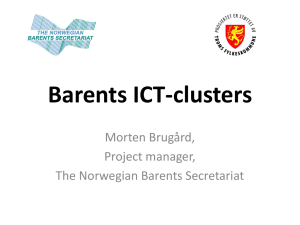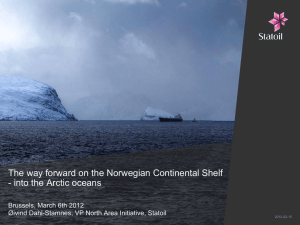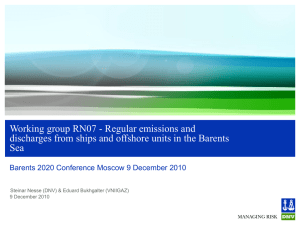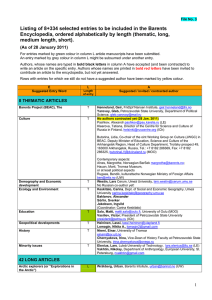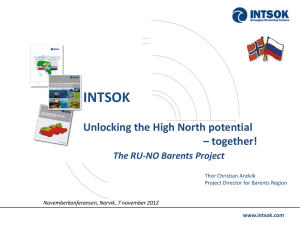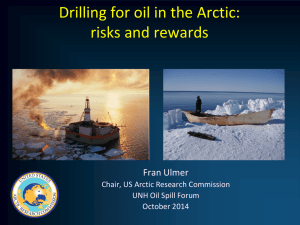The Barents Programme 2014-2018
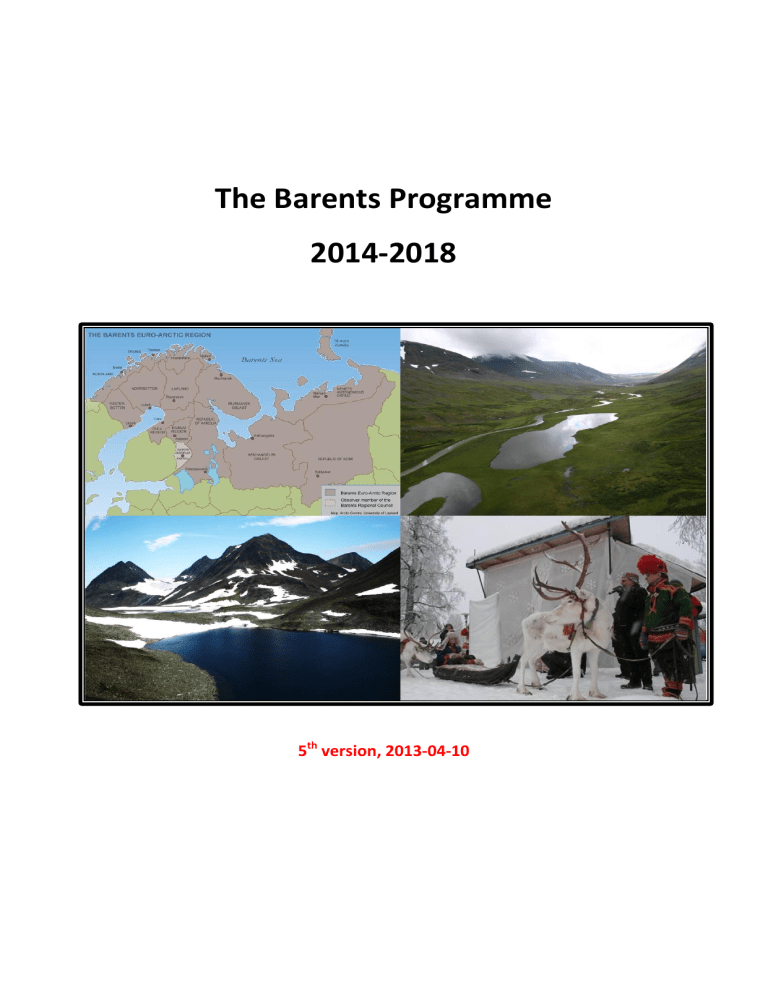
The Barents Programme
2014-2018
5 th
version, 2013-04-10
Contents
1. Introduction
The Barents Programme is the framework for the inter-regional Barents cooperation, where the priority areas of work for each period are identified. The inter-regional Barents cooperation was initiated in
1993, at the same time as the Barents Euro Arctic Council (BEAC) was established by signing the
Kirkenes Declaration on January 11 th
1993. A second Kirkenes Declaration was signed in June 2013 by the heads of participating countries of BEAC. The Barents regional cooperation consists of 13 member regions and 3 observers, but this structure could change over time and include cooperation partners also. The formal structure and administrative regulations of the regional Barents cooperation are defined in the Terms of Reference of Barents Regional Council (BRC) and Regional Committee
(RC)
1
adopted on November 14, 2012.
In Barents Region we have a strong presence of indigenous peoples, which are the Saami in Norway,
Finland, Sweden and Russia (Murmansk Oblast), the Nenets in Nenets Autonomous Okrug, and the
Vepsians in the Republic of Karelia. The indigenous peoples have historical roots established long before the present nation states existed, with language, cultural and trade characteristics, and status as indigenous peoples and minorities in all cooperating countries. Active participation of indigenous peoples in BRC and RC is natural and necessary, and has been a part of the Barents cooperation since the beginning. The overall goal for the indigenous peoples’ cooperation in the Barents Euro-
Arctic Region is to secure indigenous peoples’ rights, foundation for trade, society, culture and language. The indigenous peoples’ cooperation shall contribute to friendship and cooperation based on equality, co-existence and tolerance between the people of the region. In the light of Nenets, Saami and Veps’ status as indigenous peoples of the north, the cooperation shall secure solid health- and living conditions, as well as cultural continuity, in the future.
The Barents member regions share a significant number of similarities, most notably the Arctic climate, sparse population, long distances, vast natural resources and a high exposure to the consequences of the ongoing climate change. These characteristics impose both challenges and potentials for our mutual cooperation. During the past 20 years the region has developed a unique people-topeople cooperation, and it has grown to become one of Europe’s most important regions of natural resources.
1.1 Overall vision for the Barents Region
The overall vision that the Barents Regional Council has formulated for the regional Barents Euro-
Arctic cooperation is to increase peoples’ living conditions, to encourage sustainable social and economic development, and to have a peaceful and sustainable development in northernmost Europe.
Only by continuity of the multidimensional efforts in various areas of cooperation this vision can be reached. The vision is based on following principles:
The well-being of people who live in Barents is at the center of all the activities carried out within the framework of Barents regional cooperation.
An enhanced people-to-people cooperation at all levels remains the main achievement and the main strength of the cooperation.
All competent actors, at both regional and national levels, work together to further facilitate border crossing procedures within the region for both individuals and goods.
All actors protect the culture, customs and traditional lifestyle of the indigenous peoples of the region. Strong ties and exchanges between different groups of the indigenous peoples present in the region are facilitated.
The Barents Regional Council uses its political influence to better advocate on behalf of the people of the region on national, European and international arenas.
1
Terms of Reference; http://www.barentsinfo.fi/beac/docs/Regioan-Council-Terms-of-Reference-2012.pdf.pdf
1
National and regional authorities take all appropriate measures to ensure sustainable economic, social and environmental development on their respective territories and in the Barents Euro-
Arctic region as a whole.
Barents cooperation remains a successful model of peaceful international and interregional cooperation, and can be replicated in other parts of the world as well.
The Barents Programme 2014 – 2018 is the seventh Barents Programme since the cooperation declaration was signed in 1993. The purpose of the Programme is to suggest solutions of common challenges and to offer a general framework for the regional cooperation. While the Barents regional program provides a common vision for the region as a whole, thematic cooperation programs, and detailed plans of action of Barents working groups, will complete the picture. This general cooperation framework will, in addition, be further enriched by future programs of the upcoming chair regions.
1.2 Challenges and opportunities
Barents region attracts particular interest from Europe and overseas, mostly due to its access of natural resources and the arctic location. Due to the on-going climate change, there is an increased interest and an opportunity for new transport links on the Northern sea route. Another possibility is the greater access to natural resources. Oil and gas, as well as minerals and mining, creates economic value for both investors and local communities. There is, however, a downside of these increased opportunities considering foremost environmental implications and its effect on peoples’ living conditions which needs to be managed.
The region also faces a demographic challenge where the ageing population is increasing and the younger population, especially young women, leaves the region to live and work in larger cities in the south. There is thus a need to create an attractive living environment in order to get people to move in, stay in or return to the region. On the contrary, there is also a growing need to create new employment possibilities, preferably through business investments and innovations, since the unemployment, especially among youth, is quite high in some parts of the region.
When developing business opportunities there is, however, a necessity to adapt to the on-going climate change, as well as mitigate the progress, in order to protect the environment. Therefore, it is important to reduce greenhouse gas emission, improve water and waste management, attain cleaner production methods, and increase energy efficiency of the whole society.
These opportunities and challenges bring forth a lot of questions. For instance, how can we turn regional challenges into advantages? How can we increase knowledge about Barents inside and outside the region itself to become a stronger player on the European arena? How can we enhance people-to-people cooperation to the next level of cooperation? And, last but not least, how can we, in the long run, decrease the differences in the living standards of people who live in various parts of
Barents, and ultimately, contribute to a better life for all?
In the region we have both strengths and weaknesses considering the challenges and opportunities described above. All 13 member regions within the Barents regional cooperation have developed regional development strategies to deal with the challenges and to reach economic, social and sustainable growth. These strategies are fundamental for the development of the Barents Programme and its priorities.
1.3 Development strategies within the Barents Region
In summary, there are several common goals with the Barents region in the regional development strategies of the 13 member regions (see figure 1). All the regions suffer of demographic challenges, and high employment rates, especially among youth, and aims thus at attracting qualified workforce and developing peoples’ skills through education and lifelong learning. This issue is of great
2
importance for the development of the whole Barents region and can thus be tackled through multilateral cooperation. A second issue of importance is the utilisation of business opportunities. All regions recognise new opportunities of industrial development, especially within natural resources.
Innovations and industrial development are seen as drivers for economic growth. In this respect, renewability is of significant perception when developing both innovations and enterprises. A third are of importance for the regional development is the living environment. We need to achieve attractive living environments with a healthy milieu and good quality of life in order to attract people, especially youth and women, to stay or to move here. The desired development needs, however, good transport and logistics systems with railways, aviation, roads and sea ports to facilitate business investments and passenger traffic.
Figure 1. Development of the Barents region
Infrastructure and transport
Business
Qualified workforce,
Employment possibility
An economic and
Attractive living environments
Innovation and development
Demographic social development in the Barents Region
Cross-border cooperation
Climate and energy issues renewability
Natural resources challenges and management
The development of the Barents region, and the competitiveness arising from high-level know-how, requires a close cooperation between universities, companies and public institutions in order to form a platform for product development, innovations and internationalisation of businesses. Cross-border cooperation is vital to learn from each other and to achieve common goals. Finally, to generate visibility and advantages of the Barents region, we need to be present on international arenas as a united region.
2. Prioritised areas for 2014-2018
The Barents Programme 2014-2018 articulates the framework for a sustainable development of the
Barents region. By identification of common territorial challenges, main priorities and objectives are formed.
Essential for the economic growth in Barents region is to promote innovation and business development. It is the small and medium sized businesses (SMEs) that create most of the new employments. They are also drivers for innovativeness and proactiveness which is important for the competitiveness of Barents region. However, an increased cooperation with research and large companies needs to be promoted in order to succeed with the development and commercialisation of innovative products, services and processes. This coul d also increase the companies’ competitiveness on international markets.
3
In addition, to enhance innovation and research in the region we need to obtain a critical mass adequate enough to develop a development area further. This requires that universities and other research institutions work together with companies, municipalities and others to identify important areas of competitiveness. There is, thus, a need to identify and develop areas where the Barents region would be advantageous and successful.
To be an attractive region, not only for economic investments, considerations need to be taken regarding the living environment and natural resources. When developing the region, it must be made with concern to preserving the environment, mitigating and adapting to climate change, and fostering good and healthy living conditions for the people. Attractiveness for people to live and work in the region, as well as for the establishment of companies, is very much attached to employment, education, health, culture, surroundings, nature and recreational activities.
Barents region has a large geographical area with long distances between the cities. A prerequisite to build a critical mass for innovativeness, to foster business development and employment opportunities, and to develop the region is good transportation possibilities. As it is today, there is a lack of foremost east-west communication but also missing links in the existing transport system. Nor is the travelling across borders facilitated enough to increase mobility.
The Barents programme will, thus, during 2014-2018 aim at following:
promote creative businesses and fast growing enterprises in the region,
increase cross-border cooperation to achieve economies of scale and quality of life,
support joint management, as well as preservation, of natural resources,
implement a joint climate change adaption,
enhance innovation and research cooperation by increasing the critical mass,
focus on missing cross-border links in the transport infrastructure,
foster mobility across borders for workers, enterprises, tourist and students.
3. Implementation and responsibilities
The overall responsibility for implementing the present program lies with the council (BRC), under the chair and leadership of the respective region. The BRC may at any time decide to review parts of, or the whole, present program to better adapt it to the changing geopolitical context and economic situation, but also to eventual new regional, national or European policies and strategies.
The committee (RC) is responsible for the implementation of the Barents Programme, based on the decisions taken by the council. Both the BRC and RC will pay attention to the goals of the programme in their work. In order to generate concrete cooperation and to reach the above objectives of the
Barents regional development, the BRC has established Working Groups functioning as expert groups for the regional cooperation. For an overview of the structure of the Barents regional cooperation, see
The working groups should also be seen as a tool for the implementation of the Barents Programme, with specific focus as shown in figure 2 below. These networks should aim on creating ideas, projects and policies for the Barents cooperation, based on the priorities set in the Barents Programme, and on the mandates given from the Regional Committee. The working groups, acting as an expert group on their given field of activity, will help the regional authorities and other relevant actors in bringing the priorities of this programme into action. The working groups will play an important role in implementing the prioritised tasks in this programme and are advised to seek funding for their operation through
various funding instruments (see ANNEX 2 ).
4
Figure 2.
Working groups in Barents Cooperation.
Regional WG on
Transport and infrastructure
Joint WG on Health and related Social issues
Joint WG on Culture
Regional WG on
Environment
Joint WG on Education and Research
Joint WG on Tourism
Regional WG on
Investment and economic cooperation
Joint WG on Youth
Joint WG on Energy
The new status of cooperation partners, introduced by the Terms of Reference for the Barents
Regional Council and Committee, will, if actively used, provide additional possibilities of conducting a variety of specific projects.
The International Barents Secretariat contributes with its expert advice and administrative and technical support.
The implementation of the present program will be carried out in coordination and consultation with the national level of the Barents Euro-Arctic Cooperation (BEAC).
The Barents cooperation does not have own subsidies to finance the activities required to attain the common objectives and priorities. However, the operations arising from the implementation of the
Barents Programme could be financed by various sources on regional, national and EU levels. The main issue of the funding is to stimulate organisations on project activities and, in this way, to launch concrete cross-border cooperation developing the whole region. EU ’s financing programmes are
important instruments for implementing the Barents Programme (see ANNEX 3 ), especially the
Kolarctic ENI Programme which is the only programme including northwest Russia.
Assessment of operation activities and projects should be linked to strategies and policies of the
Working Groups, since a prime idea of the Working Groups is to create ideas, projects and policies for the Barents cooperation, based on the priorities set in the Barents Programme.
4. Other actors in the High North
Barents Euro-Arctic Cooperation is one of many organisations with interest in or operating in the Arctic region. Other essential organisations are the Arctic Council, Nordic Council of Ministers, organisations representing indigenous peoples, the Northern Dimension and the European Union. In the development of Barents Region, collaboration and information exchange with these organisations should therefore be conducted.
The European Union
Natural resources represent an important asset and possibility for the Barents Region also from the
European Union (EU) point of view. Natural resources, such as oil, gas, wood, ore and minerals, bring not only global attention to the region but also jobs and economic benefits, thus, contributing to regional development and structural policies in the EU. The Arctic is an area of growing strategic
5
importance, and the EU has an important role to support the successful arctic cooperation and helping to meet the challenges that now confront the region. EU is also a major destination of resources and goods from the region. Many of its policies and regulations therefore have implications for Arctic stakeholders and EU has, as a result, developed an Arctic policy.
Northern Dimension
The Northern dimension
2
(ND) is a joint policy regarding the cross-border and external policies between EU, Norway, Iceland and Russia. ND policy has made the Barents Region a priority, and the regional and sub-regional organisations, as well as the sub-national and local authorities, are named as actors of the ND policy. This will give new possibilities for the BRC and RC to influence the contents of the ND policy. Although transport, environment, culture, and public health and social wellbeing are the main focus areas in ND policy, all of the present Barents Programme priorities shall be viewed within the ND context.
Arctic Council and Nordic Council of Ministers
The Arctic Council (AC) and Nordic Council of Ministers (NCM) are two other organisations operating in the Nordic and Arctic region promoting cooperation, coordination and interaction among the member states. These organisations are valuable partners for the BRC and RC to discuss relevant issues considering the region and the people living there.
2
Northern Dimension; http://www.eeas.europa.eu/north_dim/index_en.htm
6
ANNEX 1.
Barents Regional Cooperation Structure
7
ANNEX 2. Working Groups of Barents Region
Here follows a short presentation of the focus of the nine working groups in the Barents regional cooperation. The working groups will play an important role bringing the priorities of the Barents
Programme into action. The groups have various objectives and tackle thus the different priorities from several angles.
Investment and economic cooperation
Commercial establishments need to be prioritised in order to achieve economic growth in the region.
To promote good framework conditions for commercial activity is one of the Barents Cooperation’s most important tasks. The member regions’ comparative advantage must be utilized to a greater degree. Better utilisation of the region’s natural resources is necessary. This applies particularly to forestry, mining, oil and gas. Further development of the Barents Region is also dependent on continuation in the heavy industry, tourism, knowledge based industries - branches of business that may utilise the region’s resources and competence areas.
Economic cooperation should also take particular consideration to facilitating entrepreneurial activities among young people, women, and indigenous peoples. Cooperation with universities and other educational institutions is to prefer. When economic investments are planned, considerations to indigenous peoples living conditions should be taken into account, and the development of economic cooperation should be promoted regionally as well as internationally.
The aim of the Regional Working Group on Investment and Economic Cooperation (RWGIEC) is to strengthen the economic development in the region by bringing focused multilateral cooperation into action considering facilitation of border crossings and improving business and investment climate in the region.
Tourism
The Barents Euro-Arctic Region has great potential to be an even more attractive destination for international tourism than it is today. The significance of tourism as a source of livelihood has grown considerably during the past decades. The tourism industry has a significant employment effect, especially on youth and women. This is particularly important in sparsely populated areas where tourism sometimes is the only source bringing income.
The attractive but fragile arctic environment, natural phenomena and cultural diversity are the key factors attracting tourists to the Barents region. The tourism business needs thus to be developed in an ecological, economic, social, cultural and political sustainable way. Sustainability is especially important when facing the challenges caused by climate change, which can affect as well promote tourism industry considerably.
Competition in the tourism business is getting tougher. The major improvements needed are related to the availability level of transportation and visa handling procedures between Russia and other Nordic countries. Today´s and tomorrow’s visitors require fast and flexible solutions. Access to fast east-west communications and smooth visa handling are necessary.
The development of tourism is still in various stages among the member regions. Through more cooperation and exchange of knowhow the development of tourism industry in Barents could be made stronger. The aim of the Joint Working Group on Tourism (JWGT) is thus to strengthen the tourism sector by promoting joint product development, cooperating in fields of tourism education and research, and influencing the preconditions for tourism development when improving transport connections.
8
Sustainable living environment
Global warming represents a threat to the living environment, also in the Barents Region. The changing climate affects many different aspects of the environment, from the basis of peoples’ living dependent on the nature to the possible change of the Gulf Stream. Climate change is especially affecting the Arctic climate and immediate action must, thus, be taken. The biodiversity of the region includes vulnerable coastal areas, large forests and taiga/tundra areas in the north. The development of oil, gas and heavy industry in order to enhance economic development must therefore be based on a safe, responsible and proactive environmental policy.
Universities, industry and young people should be engaged in this matter since they are all able to affect the future environment in the region. Considerations should be taken to indigenous peoples to improve their living conditions. Information and promotion of environmental circumstances and improvements are vital to be distributed both regionally and internationally.
The aim of the Regional Working Group on Environment (RWGE) is to improve the environmental sustainability by bringing focused multilateral cooperation into action. During the period of the Barents
Programme RWGE will especially focus on surface and drinking water, biodiversity, minerals and mining, and to inform and build public awareness and knowledge.
Transport and infrastructure
Generally, the current national transport strategies in the Barents Region are still based on the inertia of south-north thinking. Globalization will, however, necessitate and also provide new ways for developing the regional economies inside the Barents Region, but the current, poorly developed eastwest transport connections put severe hindrances to meeting these new needs.
Proper flight connections inside the Barents Region are a prerequisite for increasing economic cooperation. Development of railway connections in the region offers significant benefits for economic cooperation, as do the maritime activities, both in the Barents Sea and in the Gulf of Bothnia. Barents ports have a new role in intermodal corridors as motorways of the sea and the Northern sea route should be highlighted. Road connections leading to and from international border crossing points should be maintained on the national/federal level.
In order to get as much as possible out of our common transport system a wider use of Intelligent
Transport Systems (ITS) is a solution. ITS is an advanced application aiming to provide innovative services relating to different modes of transport and traffic management. The transport modes can thus be used in a more efficient and environmentally friendly way.
In order to develop an improved transport and logistics system in the Barents region, we need to engage as many interested as possible, and to take different interests into consideration. This is a concern for indigenous people, young people, tourists, politicians, research and education, as well as business life in the region.The aim of transport and logistics activities is to improve connections within the Barents region by bringing multilateral cooperation and projects into action to optimize transport networks on land, air and sea, and to develop and propose an integrated Barents Region Transport
Strategy.
Culture
The Barents Euro-Arctic Region is characterized by a rich cultural diversity, and culture plays a fundamental role in the human and regional development of the region. The need to focus on cultural cooperation is also a key issue in developing mutual understanding, and for paving the ground for a welfare society in the whole region.
Cultural activities, and business based on culture, contribute to regional development in many ways. A rich and developed cultural life can serve as an important tool in the world wide branding and
9
marketing of the region. Culture has the potential to make the Barents Region creative and dynamic, which can attract other investments, create more working places and attract people to live in the region. As a result, the artistic development and exchange between artists are important to facilitate, as well as cultural heritage and tourism. In addition, young people especially request a strengthened
Barents identity.
The Joint Working Group on Culture (JWGC), hence, aims to promote cultural diversity and multicultural dialogue as a tool for regional, social and economic development by strengthening the cultural identity, promoting cultural cooperation, interacting with other international structures such as
Arctic Council, Nordic Council of Ministers and the Baltic Sea States, as well as with other sectors and working groups within the Barents cooperation.
Young people
Children and Youth are the most valuable resource for the future development of the Barents Region.
They are crucial for the cooperation, the development and the sustainability of the Region. An active
Child and Youth Policy in the Barents Region is needed in order to secure a stable level of the population in the Region. An active Child and Youth Policy in the Barents Region will also contribute to the development of democracy on regional and local level through increased child and youth participation in decision making processes.
Mobility and cooperation across the boarders have to be promoted and supported, and cooperation in the field of education, innovation and entrepreneurship has to be encouraged. Moreover, transition from education to the labour market has to be improved as well as people to people cooperation through exchanges of child and youth groups and support of common multilateral projects and activities. A prerequisite for this development is improved east-west communication in the Barents
Region and a simplified visa procedure.
By bringing focused multilateral cooperation into action, the Joint Working group of Youth (JWGY) aims at increasing the participation of youth in decision-making-processes, in the labour market and in the economic sector. They want to contribute to the development of the Barents Identity, strengthen the attractiveness of the region for young people and improve their living conditions. Social inclusion and equal access for all groups is important as well as to enhance and develop sustainable structures for cooperation in the youth field.
The County Administrative board, as chairman of the BRC, and the JWGY has during 2013 gathered young people in the Barents region on a regional workshop and a national conference to discuss their future in the Barents. During these meetings the youth got the opportunity, together with actors from the Barents cooperation, to deliberate issues of importance for future development of the region. What they found significant for their future in Barents was to reach a greater youth involvement in the work of Barents cooperation, to ease up visa procedures in order to enhance cooperation further, to have a joint education system, to work for a common labour market, to reach a common identity, and, finally, to achieve a greater visibility of what actually goes on in the Barents cooperation.
Education and Research
Human resources are vital for all development areas and we need education and research to achieve change and renewal. Student exchange and international study programmes contribute to break down language and cultural barriers, and to lay a solid foundation for the Barents cooperation in the future.
A common factor for the whole Barents region is the lack of educated work force in some sectors, lack of working places in other sectors, and a net reduction of the population due to a movement to central regions. For the region to have competitive advantages we need to recruit students and labour from other parts of the world. We need to create a sustained performance distinction within, for instance,
10
natural resource management resulting in important competences building and, thereof, competitive advantages.
The aim of the Joint Working Group on Education and Research (JWGER) is to intensify cooperation in academic and research spheres and exchange international cooperation experience among higher educational and research institutions of the Barents Region. By bringing focused multilateral cooperation into action the JWGER will promote cooperation with business and industries, contribute to challenges of climate change, enhance academic mobility, broaden the range of joint academic programs and training courses, and promote education and research as efficient tools for regional socio-economic development.
Energy efficiency
Reducing the energy consumption and increasing utilisation of renewables will reduce the emissions to the air from district heating systems. This can also have a significant impact on stabilizing energy tariffs for the local population, preventing energy poverty and improving local energy security.
Profitable economic savings can be achieved by introducing renewables at boiler plants in district heating systems, and by renovating the heating systems and adopting present day solutions and technologies. Furthermore, the energy costs constitute a substantial part of a municipal budget.
The aim of the Joint Working Group on Energy (JWGE) is, by multilateral actions, to achieve improvements in the efficiency of energy production, distribution and consumption in the Barents
Region, to promotion of the use of bioenergy in northwest Russia, which will give both environmental and economic benefits, to further work on the use of Joint Implementation and the other Kyoto mechanisms, and to coordinate with other relevant initiatives.
Health and related social issues
The important task within health and related social issues is to prepare and monitor multilateral actions in each of the priority areas of the working group, to ensure coordination with other international initiatives in the region. There are three subgroups also working with actual and important issues.
These are Barents HIV/AIDS Programme, Programme on Children and Youth at Risk (CYAR) and
Programme on Tuberculosis. One of the greatest achievements of this cooperation has taken place on people-topeople level, including cooperation between NGO’s, communities, and individuals. The target groups should be the vulnerable groups in the population such as children and youth at risk, and people of sparsely populated areas.
The aim of the Joint Working Group on Health and Related Social issues (JWGHS) is to bring focused multilateral cooperation into action within the fields of healthcare and social protection. In specific they want to develop medical science and innovations, prevent non-infectious diseases, prevent and eliminate negative health environmental effects and increase exchange of experience on special trends in the sphere of healthcare.
11
ANNEX 3. Financing instruments
Financial possibilities should be taken into account when making programme implementation plans.
Kolarctic ENI CBC, the Northern Periphery Programme, INTERREG Nord and Horizon 2020 are important funding possibilities for actors and projects in the region. Other notable sources are the
Northern Dimension with its focus on the Barents Region, the Northern Council of Minister financing,
Norwegian Barents Secretariat, and national funds in each country. Here follows a more detailed presentation of the financing instruments on the EU level.
Kolarctic ENI CBC
The Kolarctic ENPI CBC programme is perhaps the financing instruments of EU which fits the Barents region the most. The programme is being implemented on the external borders of the EU, thus including northwest Russia. The programme grants financing to projects with cross-border partners and activities. A minimum requirement is that there is one participant from the Russian programme area and one participant from the Finnish or Swedish programme area, i.e. EU area.
The programme area includes Nordland, Troms and Finnmark counties in Norway, Norrbotten in
Sweden, Lapland in Finland, Murmansk and Arkhangelsk regions and Nenets autonomous district in
Russia. Västerbotten in Sweden, Oulu Region (Northern Ostrobothnia) in Finland, Republic of Karelia,
Leningrad region and St. Petersburg in Russia are also eligible regions, with certain conditions. To be noticed is that the Kolarctic ENPI CBC programme region differs from the region known as the Barents
Euro-Arctic Region (BEAR) somewhat. BEAR also includes Kainuu region in Finland, and Karelia republic and Komi republic in Russia, which are not eligible regions in Kolarctic ENPI CBC.
Northern Periphery Programme
The Northern Periphery Programme aims to help peripheral and remote communities on the northern margins of Europe to develop their economic, social and environmental potential. The success of the programme will be built on joint projects creating innovative products and services for the benefit of the programme partner countries and Europe as a whole. The programme includes the EU member states of Finland, Ireland, Northern Ireland, United Kingdom and Sweden and Non-EU member states
Faeroe Islands, Greenland, Iceland and Norway.
INTERREG NORD
INTERREG Nord is an EU financial instrument that supports cross-border cooperation for the period
2014-2020. The goal is to strengthen the economic and social development by supporting cooperation projects across national borders. The programme area covers Norrbotten and some municipalities in
Västerbotten in Sweden, Lapland, Northern Ostrobothnia and Middle Ostrobothnia in Finland,
Nordland, Troms and Finnamark County in Norway, and the area of Sápmi.
Horizon 2020
Horizon 2020 is the financial instrument implementing the Innovation Union
3
a Europe 2020
4
flagship initiative aimed at securing Europe's global competitiveness. Running from 2014 to 2020 the EU’s new programme for research and innovation is part of the drive to create new growth and jobs in Europe.
The programme focuses on international cooperation and global challenges and is thus also an option for the Barents Region to take a lead in the Arctic cooperation, including countries as Canada and
USA.
H2020 is focusing on key priorities as Excellent Science , Industrial Leadership and Societal
Challenges.
For the Barents Region excellent science provides, for instance, funding options for mobility among researchers in-between the Barents universities, and funding of an e-infrastructure for cooperation within the Barents Region, the Arctic Region as well as globally. Industrial leadership aims
3 http://ec.europa.eu/research/innovation-union/index_en.cfm
4 http://ec.europa.eu/europe2020/index_en.htm
12
at making Europe a more attractive location for investments in research and innovation by promotion of activities where businesses set the agenda. It would provide major investment in key industrial technologies, maximize the growth potential of companies and help innovative SMEs to grow into world leading companies. The Barents Region has specific strong research and business areas of strategic importance also for Europe in a broader context. Examples of areas are forest industry, renewable energy, and industrial services as automation for processing industries, minerals, oil and gas, tourism, and technology products and services in a cold climate. Societal challenges addresses major concerns shared by citizens, and by a challenge-based approach, it can bring together resources and knowledge across different fields, technologies and disciplines, including social sciences and humanities.
13
